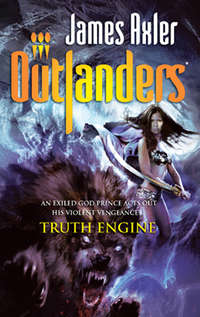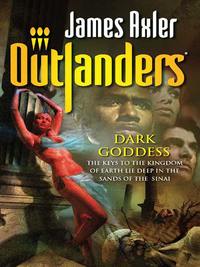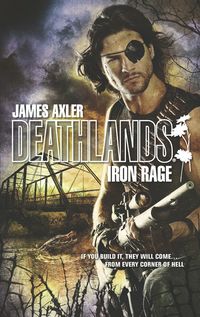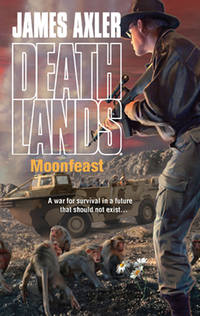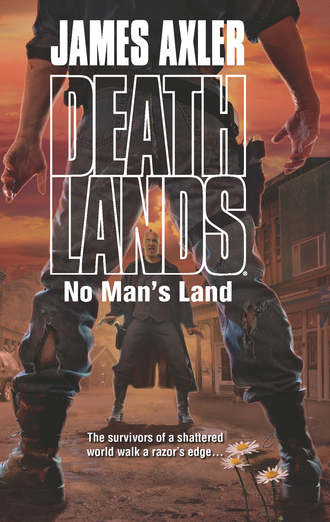
Полная версия
No Man's Land

DARK EVOLUTION
There’s little to remember about life before the Big Nuke, but there’s plenty to scavenge in the tainted wreckage of the post-apocalyptic frontier. The barbaric code of survival of the fittest, meanest or dirtiest makes for hard living and easy death. But Ryan Cawdor and his friends have stayed alive by holding on to their humanity—playing fair...and chilling only when they’ve got no choice.
GRIM PASSAGE
A civil war raging in the Des Moines River valley forces Ryan and his companions to take sides, or die. Because somewhere in the middle of the generations-old conflict is a lost redoubt. But Snake Eye, the deadliest gunslinger in Deathlands, stands between them and the way out. And the mutie contract chiller won’t step aside until he has Ryan’s head.
In Deathlands, there’s nothing but rock and a hard place....
“Help me up!”
Somebody did, and—while he managed to solidify his perch by hanging on to the saddle horn like the rankest newbie—Ryan realized that the same someone had also relieved him of the SIG-Sauer, then stuffed it back in his holster.
Then they were riding out through the open gates of the barbed-wire compound, across the starlit prairie.
From behind, he heard the shouted challenge, “Run, little rabbits!” The voice, heard only recently for the first time, was already unmistakable to Ryan. And hated.
“Damn,” Mildred swore. “I thought we killed that mother.”
“Run far, run fast, little rabbits,” Snake Eye called again. “Run and hide! But you’ll only die tired!”
No Man's Land
James Axler

www.mirabooks.co.uk
War may sometimes be a necessary evil. But no matter how necessary, it is always an evil, never a good. We will not learn how to live together in peace by killing each other’s children.
—Jimmy Carter
Nobel Lecture,
Dec. 10, 2002
THE DEATHLANDS SAGA
This world is their legacy, a world born in the violent nuclear spasm of 2001 that was the bitter outcome of a struggle for global dominance.
There is no real escape from this shockscape where life always hangs in the balance, vulnerable to newly demonic nature, barbarism, lawlessness.
But they are the warrior survivalists, and they endure—in the way of the lion, the hawk and the tiger, true to nature’s heart despite its ruination.
Ryan Cawdor: The privileged son of an East Coast baron. Acquainted with betrayal from a tender age, he is a master of the hard realities.
Krysty Wroth: Harmony ville’s own Titian-haired beauty, a woman with the strength of tempered steel. Her premonitions and Gaia powers have been fostered by her Mother Sonja.
J. B. Dix, the Armorer: Weapons master and Ryan’s close ally, he, too, honed his skills traversing the Deathlands with the legendary Trader.
Doctor Theophilus Tanner: Torn from his family and a gentler life in 1896, Doc has been thrown into a future he couldn’t have imagined.
Dr. Mildred Wyeth: Her father was killed by the Ku Klux Klan, but her fate is not much lighter. Restored from predark cryogenic suspension, she brings twentieth-century healing skills to a nightmare.
Jak Lauren: A true child of the wastelands, reared on adversity, loss and danger, the albino teenager is a fierce fighter and loyal friend.
Dean Cawdor: Ryan’s young son by Sharona accepts the only world he knows, and yet he is the seedling bearing the promise of tomorrow.
In a world where all was lost, they are humanity’s last hope....
Contents
Prologue
Chapter One
Chapter Two
Chapter Three
Chapter Four
Chapter Five
Chapter Six
Chapter Seven
Chapter Eight
Chapter Nine
Chapter Ten
Chapter Eleven
Chapter Twelve
Chapter Thirteen
Chapter Fourteen
Chapter Fifteen
Chapter Sixteen
Chapter Seventeen
Chapter Eighteen
Chapter Nineteen
Chapter Twenty
Chapter Twenty-One
Chapter Twenty-Two
Chapter Twenty-Three
Chapter Twenty-Four
Chapter Twenty-Five
Chapter Twenty-Six
Chapter Twenty-Seven
Chapter Twenty-Eight
Chapter Twenty-Nine
Chapter Thirty
Chapter Thirty-One
Chapter Thirty-Two
Chapter Thirty-Three
Prologue
With a whistling scream the cannonball arced across the clear blue sky.
Snake Eye could probably have seen it had he looked. The things were often visible in flight, and his human eye was very keen.
So was the other eye, hidden behind a black enameled-leather patch.
He didn’t bother, any more than he bothered to duck when the explosive charge went off a street over in the small, deserted ville called Taint. It was well named. Not much to look at, much less visit, even by modern-day standards, Taint was a cluster of a few dozen ramshackle structures of sun-warped, rotting planks, scabbied brick-and-concrete chunks, and even sod, piled together without much thought, much less upkeep, on a stream that ran through a wide, flat valley on its way to the Des Moines River. At the moment, it happened to lie right between the armies of the Uplands Alliance and the Des Moines River Valley Cattlemen’s Protective Association, who were coming together in the latest installment of their generations-long war.
Snake Eye was the perfect mercie. He was good at his job, faster than any normal human, and his heart was cold beyond stone. He always fulfilled a contract and took pride in the fact.
As he did in every aspect of his job. A happy mutie was Snake Eye.
If a person despised him because he was a mutie—and never troubled to hide it—that wasn’t his problem. He couldn’t be bothered to care. If a person tried to give him trouble for being a mutie, that wasn’t his problem, either.
He stood in the mouth of a narrow alleyway that stank of piss and rot, where he could have some cover as he glanced up and down the street with his one exposed eye. Because he was confident in his abilities didn’t mean he was cocky; it was his heart that was stone, not his narrow, hairless head. He knew that a random piece of shrapnel or a slug could chill him as readily as any dirt-grubber or sheep farmer caught up in events beyond his control and forced to play soldier.
Snake Eye adjusted his slouch hat and moved off with purpose down the narrow rutted street. He had a pretty fair idea where he would find his subject this fine April morning. A ville currently being contested via black powder cannon being fired from outside by two full-on warring baronial armies seemed a pretty unlikely hiding place for a man who was never known for being long on courage.
But the merchant Ragged Earnie was also a noted homebody, and he had more than one reason for sticking tight to the little store where he lived, aside from a desire not to leave his precious goods untended where stragglers might get an urge to loot them—not that he’d confront an armed sec man if one did, of course. Taint prospered, to the extent it did, from lying in essentially neutral ground in the conflict between cattle barons of the river valley and the sheepmen of the higher country above the bluffs to the north. Earnie had prospered, too, if much better than the ville at large, speaking proportionally. Now he might hope to cut a deal with the winner, provided he survived the barrage.
And that was no blue-sky prospect, either: these were the Deathlands, where not even the prospect that the sky would turn a weird venomous yellow and send tornadoes to smash you with debris or suck you up to your doom was as terrifying as when the sky turned orange and tortured and rained down Hell. Naturally his subject had a storm cellar, and shells and solid iron balls raining down from the sky were a pretty fair excuse for taking shelter there, too.
Or just staying out of the way of random bullets and other trouble. A few sec men from both sides had had the poor luck, or worse judgment, to wander into Taint. Now, as Snake Eye left his brief shelter and turned onto the block where his subject had his store, a pair of them were carrying on their own miniature war right in the damn street where Snake Eye needed to go.
Actually, the kid in the hayseed canvas shirt and trousers, with a green Uplander armband tied around an arm, was an obvious conscript who might as well still have sheep feces on the heels of his boots. He was lying prostrate in the street, and the man standing above him getting ready to shove a bayonet into his belly was obviously a veteran. The guy’s status as a sergeant was made obvious by the fact that he wore an actual uniform, if of blue-dyed homespun rather than pricier scabbie.
The long, narrow blade made a wet sound going in. Walking calmly down the street toward the little drama, Snake Eye heard the bayonet grate on the hapless kid’s spine. The Uplander let loose a gagging, strangling, squealing scream and thrashed wildly.
The Protector leaned on the rifle, driving the bayonet deep. Even without currently being able to see the bearded face, Snake Eye knew he wore a big old grin beneath that blue kepi-style cap. The bluecoat’s posture made it clear how much he was getting off on his victim’s unbearable agony, as a red stain spread across the kid’s shirt.
Smiling, Snake Eye reached up and flicked his eyepatch onto his forehead with a thumb.
The sergeant heard the crunch of boots in the mostly dry mud behind him and looked over his shoulder. Blue eyes went white in a face that showed hard years and harder mileage, even through the wiry black beard and the grime and soot caked onto it.
He looked Snake Eye in his hidden eye and screamed.
Frantically the soldier began to tug on his weapon. He assumed anyone who looked like that, much less a man who would so boldly approach a sadistic murder being carried out under the guise of warfare on an open street in the middle of the day, could mean no good.
And rightly so. But in his sadistic glee he’d plunged his bayonet all the way through the howling boy’s skinny body and deep into the mud below. It was hard enough getting a blade out of flesh; that was a big reason Snake Eye preferred a blaster. Now the sergeant’s main weapon was well and truly stuck.
Snake Eye was always fast on the draw, but he never rushed. That was part of what made him the deadliest blaster in the Deathlands.
The faster-than-human speed and reflexes didn’t hurt, either.
He pulled his right-hand Sphinx autoblaster from below the black duster he always wore, brought the weapon to eye level and shot the sergeant through the face. He smiled, slightly, as he saw the man’s eyes go wide and then start from their sockets to either side of a black hole that appeared between them. A divot of skull, like sod with black grass, flew out behind in a spray of blood and brain matter.
The Protector fell right down across the body of his victim, who continued to struggle and screech.
Snake Eye slipped the patch back into place over his right eye.
That kind of moaning scream came from deep down in a man’s bones. It hit other humans the same way. It was designed to be heard and responded to, even above other noise—even the sound of a cannonade and the boom of shells.
And as such the horrific scream would draw other humans like flies, that inhuman, keening wail that barely seemed to pause for breath.
As Snake Eye swung by, his long legs never breaking stride, he drew his left-hand blaster and without even glancing around put a .40-caliber Smith & Wesson bullet into the kid’s right eye. The mercie didn’t need anybody else horning in. He had a job to do, and the dust of a ville that’d been snakebit in the dick even before two armies started to bash the hell out of it to shake off his boot heels.
He was a successful chiller. The best. And as such he had a schedule to keep.
* * *
A CANNONBALL HAD created an impromptu skylight in a corner of Ragged Earnie’s cramped and crowded little general store. It was either an iron round or another shell that never went off, as was none too uncommon for the state of modern artillery a couple centuries after the skydark. When it existed at all. It had smashed the glass of a display counter to glittering snow on the plank floor, bounced through a shelf of sundries, leaving cloth bales, hammers and broken-open bags of meal from some baron’s mill strewed everywhere.
Snake Eye trod on a baby doll from the counter that lay on its back staring toward the sky with blank blue eyes. It was predark itself, high-class scabbie and hence expensive. The plastic body was brittle and readily cracked, but the little voice box still managed to croak “Ma-ma” before he crushed it.
He proceeded through a door behind the wooden counter and into the narrow confines of a storeroom even closer packed with canned goods and unique items than the shelves outside. Snake Eye found what he expected: a wooden hatch in the floor. Squatting well to the side, he grabbed the brass ring and yanked it open.
A flash and a boom erupted from the hole. A charge of buckshot shattered a Mason jar full of prenuke glass eyeballs on a shelf six feet away from where Snake Eye sat on his haunches. Allowing himself the briefest of smiles—he liked being right, even if he almost always was—he jumped right through the hole.
The storm cellar beneath was full of stacked burlap bags, eye-watering gunpowder smoke and one terrified fat man huddled by a cot in one corner pointing a long double-barreled shotgun in Snake Eye’s general direction.
“Don’t come a step closer,” he said in a quavering voice. “I’ll blast you soon as look at you. Sooner, you damned mutie chiller!”
Suddenly Snake Eye had skipped the several paces across the hard-packed dirt floor, grabbed the double barrels and twitched the blaster out of Ragged Earnie’s grip.
“So you recognize me, do you?” Snake Eye asked.
“Everybody knows you!” the shopkeeper said. “The coldest-hearted blaster that ever blasted his own mother for pay!”
“I’ll take that as an endorsement of my marketing techniques,” Snake Eye said, grinning. “Even though I barely got more than a crust of dry bread for wasting the bitch who pupped me. Still, it’s the principle of the thing. And speaking of principles, since you know me, you must know I haven’t come to pay a purely social call, any more than I have come to make a purchase at this fine, fine emporium.”
He drew one of his matte-black Swiss-made blasters and aimed it at Earnie’s face.
The old man promptly averted his gaze, closing both eyes tight and throwing up both hands in a ridiculous gesture at self-protection. Snake Eye’s human eye, the left one, which missed damned little, noted a darkness that spread across the brown dirt floor around the seat of Earnie’s baggy coveralls, glistening slightly in the low light of the hurricane lantern on the floor nearby.
After a moment Earnie pried open his nearer eye. It was a startling blue. It reminded Snake Eye of the eye of the sergeant he had just chilled down the street outside: bright, sharp and as clear as a midwinter morning sky.
He liked to remember such details and cherish them in his memories as trophies of his chills. Even the ones he didn’t get paid for.
“Well,” the merchant demanded.
“Well, what?”
“Why aren’t you getting on with it? Why ain’t you blasted me yet and had done with it? You trying to torture me, you triple-rad-blasted taint?”
Under the circumstances Snake Eye found the slur amusing, the more so for its apparently unconscious resonance.
“Are you in a hurry, old man?” he asked.
“Well, why didn’t you shoot me yet?”
Snake Eye shrugged. “Professional courtesy. It’s so important in my business. More so, since it’s so rare in the world today. I find subjects often like to say a few words before I finish the assignment. Unburden their souls, if you will. It seems only decent of me to allow them their final say. So long as they don’t take too long.”
The old man dropped his hands and turned his face back toward Snake Eye. His other eye opened. Into both came a calculating look.
Somehow, that didn’t surprise Snake Eye.
“What’s Big Erl paying?” Earnie asked. “I’ll double it.”
“You know better,” Snake Eye said, “if you know who I am. I always carry out a contract. Integrity is my hallmark. Another rarity in these degraded times.”
“I’ll pay what I owe!”
“Sorry,” Snake Eye said. “It’s too late for that. I made a deal. Besides, you must realize you’ve got more than jack or treasure against your account with Mr. Kendry, now.”
Earnie blew out his gristly gray-pink lips in a sigh. His drooping liver-spotted cheeks were fuzzed with patchy gray stubble.
“It was a mistake setting up Big Erl for the Uplander to ambush,” he said. “I admit it. But it seemed like the best idea at the time. I owed him money. Times turned hard, with the war back on. I couldn’t pay. He was fixing to bring the full entire wrath of his buddy Baron Jed of Hugoville and the Protective Association Army down on my poor chapped old ass. What else could I do?”
“First off, do a better job,” Snake Eye said. “Setting up a rich and powerful landowner like Erl Kendry is one thing. Doing it so shoddily enough that he didn’t die is another. And getting his son and heir Fank iced in the process?” He shook his head. “That, my friend, qualifies as a mistake.”
His finger tightened on the trigger. Earnie flung up his hands again.
“Wait!”
Snake Eye considered the request a moment, then lowered the piece.
“I’m waiting.”
He reached into the watch pocket of the lean-cut black jeans he always wore and flipped open the face of an antique fob watch.
“Fifteen seconds, to be precise,” he said.
To his credit the merchant didn’t piss away any time protesting. “I know something,” he said. “There’s a great, big fortress hidden nearby—somewhere. The kinda place the whitecoats built back in the old days, back before the Big Nuke and the long winter, so they’d have a place to ride the shitstorm out. It’s packed to the rafters with primest scabbie—weps, ammo, commo equipment, meds that would make your eyes pop. Sorry—eye.”
“I have two,” Snake Eye said equably. “The patch notwithstanding. It’s not a sensitive subject.”
The allotted time had ticked past on his watch. Ragged Earnie had engaged his interest, though. Still, he ticked a black-taloned thumb against the scratched crystal face to indicate the merchant shouldn’t dawdle.
“Some even say it has this magic room, makes you fly from one place to another,” Earnie said. “I don’t put no stock in that nonsense, of course. But I know it’s true. I talked to a man saw it with his own eyes. It’s within twenty mile of where we sit now, I can tell you that much.”
“So tell me where exactly.”
“Nope,” Earnie said. “Then I wouldn’t be no more use to you, now, would I? What do you got to say to that, Mr. Triple-Smart Mercie? But somebody else who knows the secret—that’d be Big Erl. We were partnered-up about it, but sadly matters took a turn southward between us.
“So now, all that’s standing in the way of you and me joining up and getting rich as barons ourselves is Erl his own blubber-ass self! So let’s just say we negotiate a deal, you and me? You chill Erl and I’ll let you in on half!”
“Done,” Snake Eye said. And he brought up the blaster and shot Earnie right out from behind his own triumphant grin.
He stood a moment, the handblaster held down by his side, shaking his head at his slumped victim.
“The poor fools,” he said, “always say too much and hear what they want to hear. And now I’ll take it all, thank you kindly.”
He slid the piece back in its tooled-leather holster.
“See, old man,” he said, “it’s as I told you. I always keep a contract.”
Chapter One
“Well,” Mildred Wyeth said, staring into the low, pallid blue and yellow flames of their campfire, “this sucks.”
They had pitched camp in a low patch of the rolling countryside that, according to the sighting J. B. Dix had taken on his minisextant before the sun went down, had to be part of what in her day they called southeastern Iowa. They liked low ground because it kept them from being silhouetted to prying eyes. Even sometimes allowed them to build a small fire without much concern the light would betray them.
The fuel didn’t produce much light nor heat. Nor did the dried cow flop impart a flavor Mildred found pleasing to the brace of prairie dogs Jak Lauren had roasted over the fire while his new best friend Ricky Morales kept watch.
Her companions scarfed them down, of course, as if they were slices of predark chocolate cake slathered with thick icing. Mildred had to admit that she had eaten worse, so she helped herself to the stringy, shit-smoked rat meat.
“Why, my dear Dr. Wyeth,” Doc said, “we have found ourselves in much more pressing straits, as surely you recall.”
Doc Tanner had an excuse for talking like a professor out of the history books: he was one. He was even older than she was, chronologically, although in years actually lived through, awake and aware, not so much, though she looked to be in her late thirties and he seemed to be crowding seventy. She had been put into experimental cryogenic sleep when something went wrong during exploratory abdominal surgery—right before the U.S. and the Soviet Union had at last gone to war. Doc had been trolled from his happy family in the 1890s by a cadre of scientists from Mildred’s own day, and cynically dumped into the future when he proved to be a difficult subject.
“More urgent, yeah,” she said. “But it’s the irony that’s pissing me off.”
“What irony’s that, Mildred?” Krysty Wroth asked. The redhead had her long, strong, shapely legs bent beneath her in what Mildred could clearly see was far too graceful to go by the name of a squat. Her green eyes took in the dingy light of the flames and cast them back as glints of emerald radiance. Her long red hair stirred about her shoulders in a way that bore no relationship to the restlessness of the spring night air.
The night was cool to the crisp edge of chilly. The breeze that stirred the low dim flames like a ladle stirring flavorless gruel would bite deep and hard if it came any fresher. The night insects hadn’t found their voices yet. Some cows lowed off in the distance.
“This broken world can hardly muster a ville bigger than a hundred people,” she said, “much less a good, solid war. And here we’ve gone and landed ourselves right smack-dab in the middle of the real deal.”
“Shit happens,” Ryan Cawdor said.
The tall, rangy man stood with his back to the fire, the breeze flapping his shaggy black hair, and his coattails around his calves. His lone eye, she knew, was gazing off across the rolling countryside. He wasn’t comfortable with their setting and circumstances, either. Not that anyplace in the here and now could be called reassuring for a man or woman born into the times, any more than relative newcomers like Mildred and Doc.
She did reflect, bitterly, on how it was just her luck that one of the lamer catchphrases from her own day would survive the intervening century.
“Sometimes it happens to us.”



